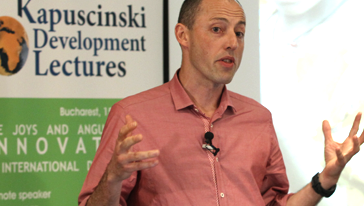Owen Barder argued that development should be understood as an emergent feature of a complex adaptive system, which usually have the following five characteristics:
- Its evolution is difficult to predict
- It cannot be pinned down to a component
- It can have a broad shape, but it remains largely unpredictable when it comes to details
- It tends towards greater complexity
- It does not tend towards equilibrium
The argumentation was built around the ideas that evolution would generate more efficient solutions, that society and economy are outcomes of adaptive processes, habits, products, institutions, and individuals, and that change is possible through adaptation.
In supporting his claims, he gave examples from fields as diverse as psychology, climate studies, economics and engineering.
The last part of the lecture consisted of seven policy recommendations:
- Resist social engineering (because evolution outperforms design) and avoid isomorphic mimicry (new institutions would not have the drivers for evolution to perform)
- Resist fatalism
- Promote innovation
- Embrace creative destruction (there is a feedback loop that selects those performing)
- Shape development
- Embrace experimentation
- Act globally






